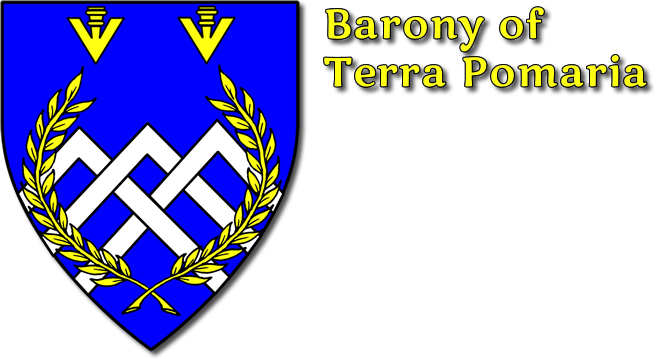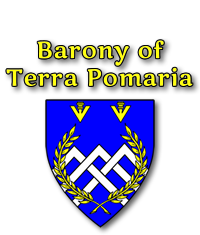17 Jul Naranjiya from “A Baghdad Cookery Book”
Then Serve It Forth…
By Lady Rosemary Willowwood de Ste. Anne
Did I say it was summer LAST month? What foolishness! As we sweat in the oven of the sun, I am reminded of tales my father’s retainers told me as a wee thing, of the time they spent with his liege, Simon de Montfort, in the Holy Land on crusade. One of the retainers brought a wench back from Baghdad, who in the blazing summers, would become nostalgic and tell me of the foods of her homeland. This recipe requires no translation from me, for I had a learned priest translate it from the Byzantine tongue.
“Naranjiya”
From A Baghdad Cookery Book, From about 1226
Attributed to Muhammad ibn Hasan ibn Muhammad al-Karim al-Katib al Baghdadi
TRANSLATION: Cut fat meat into middling pieces, and leave in the saucepan, covered with water, to boil: when boiling, remove the scum. Add salt to taste. Cut up onions and leeks, washing in salt and water: scrape carrots, cut into strips four fingers long, and throw into the pot. Add cumin, dry coriander, cinnamon-bark, pepper, ginger and mastic, ground fine, with a few strips of mint. Mince red meat well with seasonings and make into middle-sized cabobs. Take oranges, peel and remove the white pulp, and squeeze. Let one person peel and another do the squeezing. Strain through a sieve, and pour into the saucepan. Take cardamom seeds that have been steeped in hot water an hour: wash, and ground fine in a stone mortar, or a copper one, if stone is not procurable. Extract the juice by hand, strain, and throw into the pot. Rub over the pan a quantity of dry mint. Wipe the sides with a clean rag, and leave over the fire to settle: then remove.
REALIZATION: Cut inexpensive well-marbled meat (short ribs for beef, or pieces for lamb stew) into 1-inch cubes. (ALL MEASUREMENTS ARE FOR ONE POUND OF MEAT; EXPAND ACCORDINGLY, IF YOU ARE MAKING MORE.) Barely cover with water, and bring to a gentle boil. Skim any foam that rises. Salt (gently) to taste. Add about 1 cup finely chopped mixed onions and leeks. Peel 2 carrots, cut into lengths about 4 inches long, slice into strips, add to the pan. Add about ½ tsp. each of ground cumin, coriander, cinnamon, pepper, ginger and mastic (see glossary) and about a tablespoon of dried mint, rubbed between your hands. The “cabobs” are probably kofta meatballs, of very finely ground beef or lamb seasoned with salt, pepper, mint, allspice, a slice of fresh bread, and a bit of egg. This mixture is either ground or pounded in a mortar until almost smooth, and shaped into oval balls about the size of the end of your thumb. You can brown them first, or just gently poach them in the broth. Thinly peel 1 orange, taking only the orange “zest”, and leaving the white inner peel, which is bitter. Cut the zest into fine strips. Juice the orange, strain the juice, and add to the saucepan with the peel. Add about ½ tsp. ground cardamom. (If you want to be profligate and authentic, buy whole dried cardamom, soak and grind at least a tablespoon of the seeds as in the recipe, and squeeze then through a coffee filter or paper towel.) Simmer very gently for about an hour, or until the meat chunks are tender. (Slow-cooker is also a possibility here.) Serve over couscous or rice, with a dessert of dates and nuts, and, of course, sweetened mint tea.
This recipe is analogous to the modern Middle Eastern tagine or kouresht, which are stews made with meat and fruit. Those of you who speak Spanish may recognize the word for “orange” in the title. The usual Middle Eastern meat would be lamb or goat, but beef will also work if you dislike lamb; it just doesn’t have quite the character. If the taste of orange looks like it might be too strong for your preference, simmer the orange zest gently in water for 10 minutes, drain, and add. While red meat is used here, tagine is also frequently made with poultry (chicken or duck). You could try simmering fairly large chunks of chicken breast, with kofta made of seasoned ground turkey. However, since there is little tenderizing to do with poultry, only cook for about 30 minutes.
GLOSSARY:
Mastic: Mastic is the dried sap of the mastic tree (Pistacia lentiscus). It is a clear crystal available in Middle Eastern specialty shops. You can either buy the crystals and grind them in a mortar, or if you are lucky, the shop may have the powdered spice. It is very common in Middle Eastern recipes. If you just chew some, it has a rather pine-y character. If a pilgrimage to find the ingredient is not in the cards, try adding about ½ cup of pine nuts.



